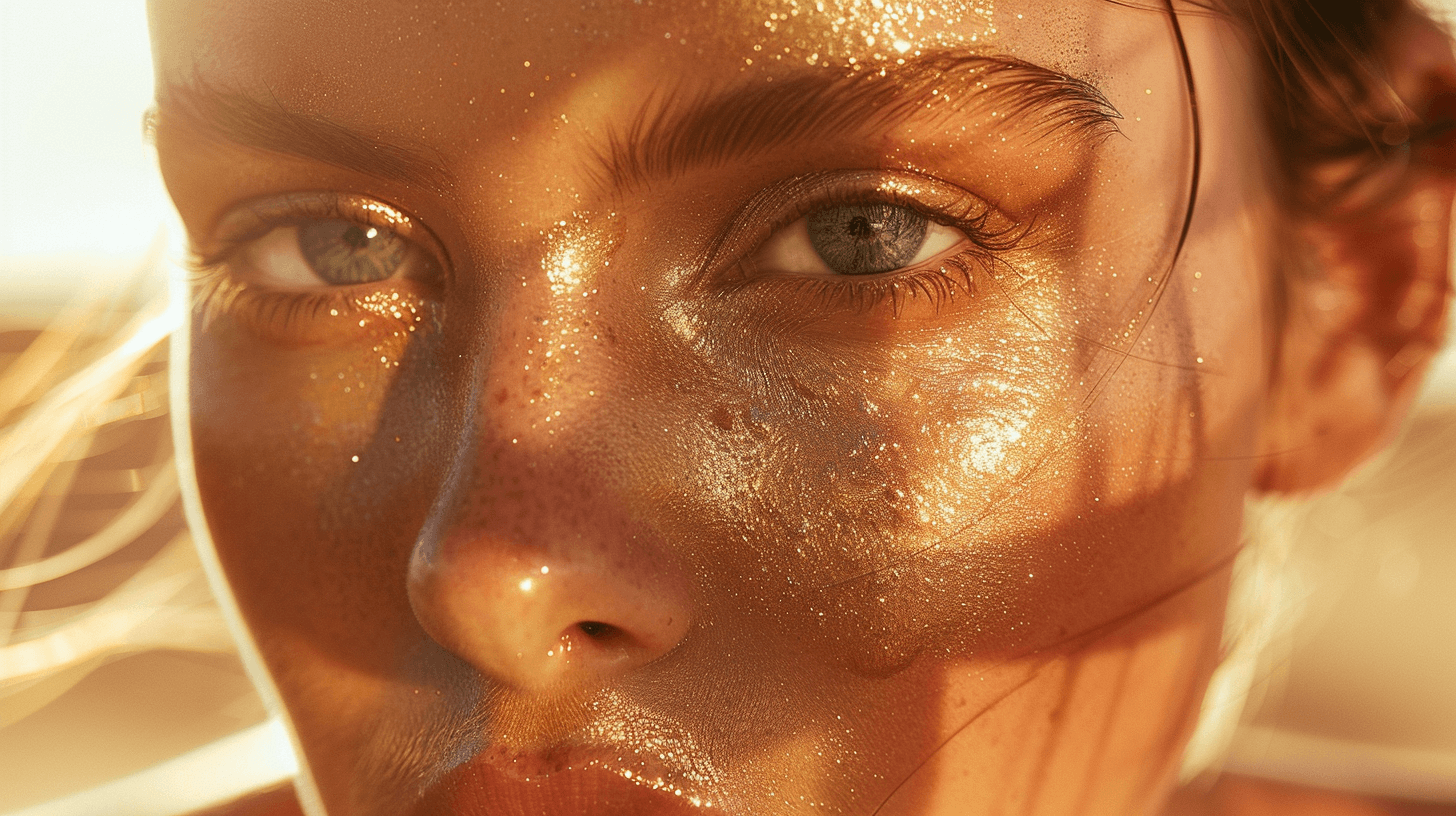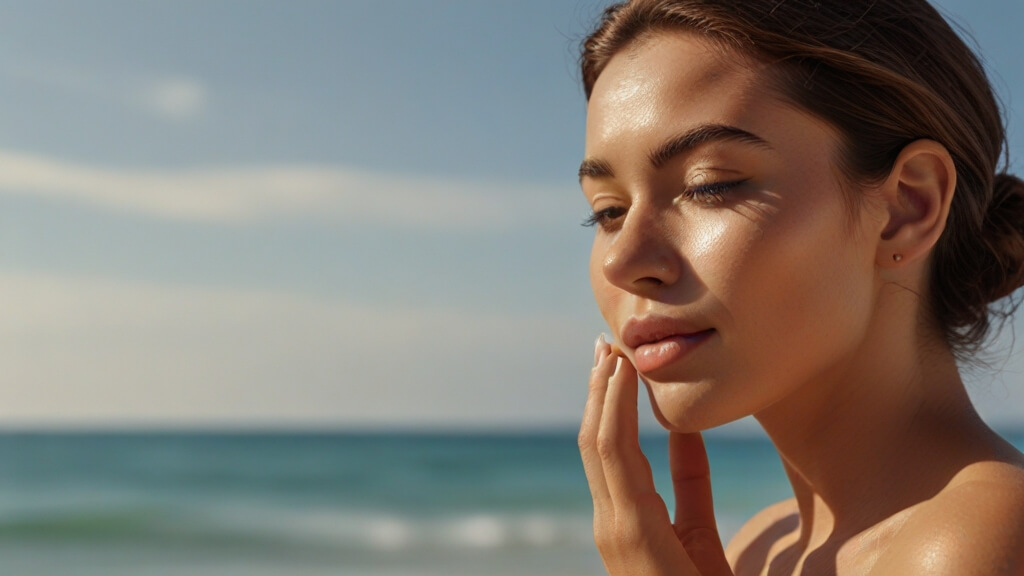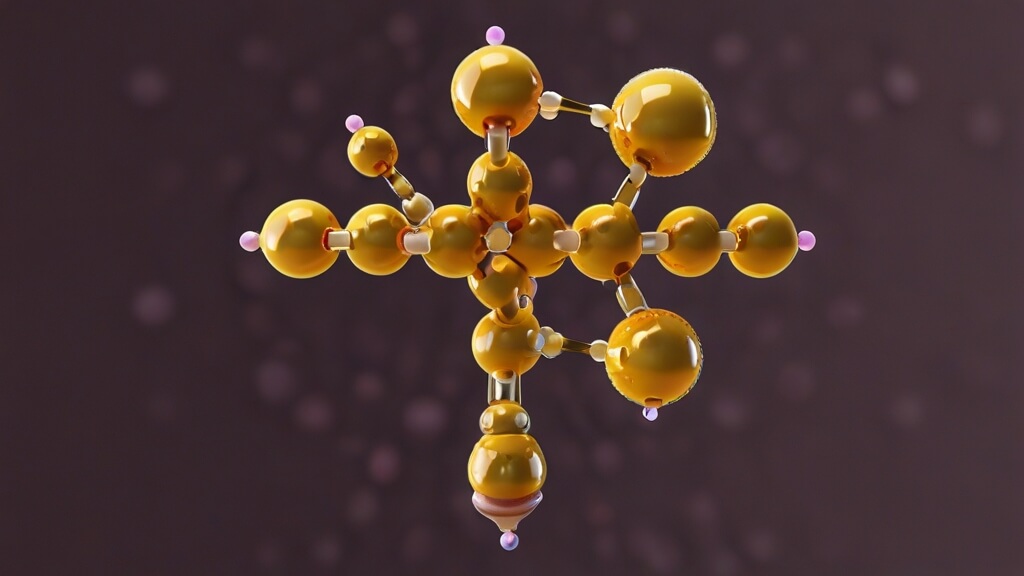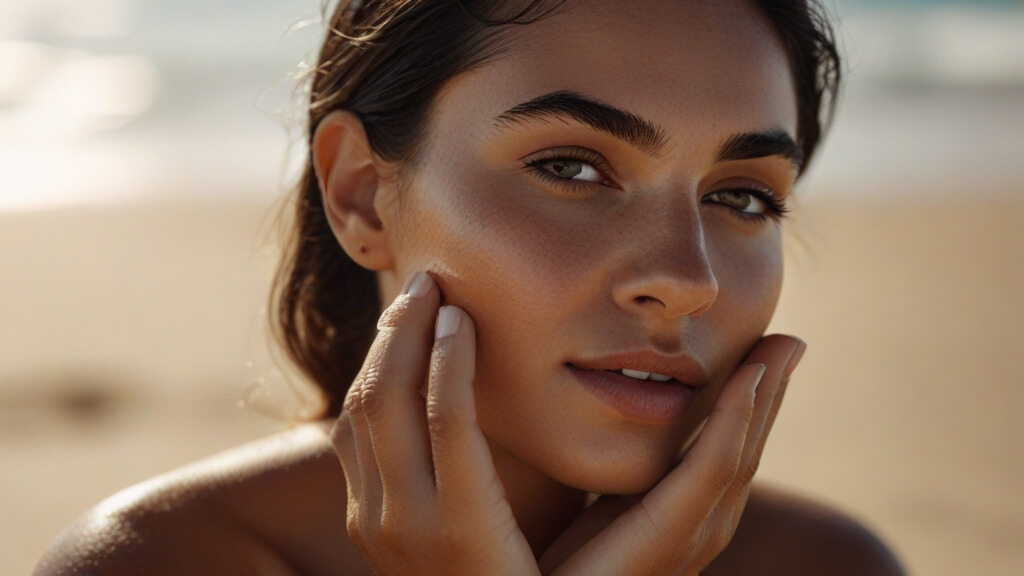
Leila Chaoui
An expert in natural beauty remedies, our author brings a wealth of knowledge and passion for Moroccan Argan Oil, guiding readers on its benefits and versatile uses for radiant skin and hair.
Key Takeaways
Are you tired of slathering on sticky sunscreens that leave your skin feeling greasy and weighed down? Look no further than argan oil for your skin’s UV defense needs. Packed with potent antioxidants and nourishing vitamins, this natural elixir provides a protective shield against harmful UV radiation. But that’s not all – argan oil offers a multitude of benefits for your skin, from promoting a healthy tan to improving its overall texture. So, why settle for ordinary when you can discover the extraordinary benefits of argan oil for your skin’s sun protection?- Argan oil acts as a natural sunscreen, blocking UV radiation and protecting the skin from sun damage.
- It contains high levels of tocopherols, antioxidants, and omega oils, which help lighten dark spots and protect collagen.
- Argan oil provides a healthy bronze glow and can be used as an alternative to chemical-based sunscreens.
- It is quickly absorbed by the skin without leaving a greasy residue and promotes skin elasticity while reducing wrinkles.
Benefits of Argan Oil for Skin UV Defense
 Argan oil offers numerous benefits for protecting your skin against harmful UV radiation. It acts as a natural sunscreen, thanks to its ability to block UV radiation by inhibiting skin pigment cell proliferation. The high content of tocopherols, vitamin E, antioxidants, and omega oils in Argan oil contribute to its sun protection benefits. These components work together to shield your skin from the damaging effects of UV radiation.
UV radiation can cause sun damage, leading to dark spots and premature aging. Argan oil helps lighten these dark spots and protects collagen, maintaining the integrity of your skin. By using Argan oil as a natural sunscreen, you can effectively defend your skin against UV radiation and promote a healthy complexion.
In addition to its sun protection properties, Argan oil filters harmful rays, leaving your skin with a healthy, bronze glow. It is a great alternative to chemical-based sunscreens that often contain harmful ingredients. However, it is important to note that while Argan oil offers some sun protection, it is not a substitute for sunscreen with a high SPF. For extra sun protection, consider using organic mineral sunscreen in conjunction with Argan oil.
Argan oil offers numerous benefits for protecting your skin against harmful UV radiation. It acts as a natural sunscreen, thanks to its ability to block UV radiation by inhibiting skin pigment cell proliferation. The high content of tocopherols, vitamin E, antioxidants, and omega oils in Argan oil contribute to its sun protection benefits. These components work together to shield your skin from the damaging effects of UV radiation.
UV radiation can cause sun damage, leading to dark spots and premature aging. Argan oil helps lighten these dark spots and protects collagen, maintaining the integrity of your skin. By using Argan oil as a natural sunscreen, you can effectively defend your skin against UV radiation and promote a healthy complexion.
In addition to its sun protection properties, Argan oil filters harmful rays, leaving your skin with a healthy, bronze glow. It is a great alternative to chemical-based sunscreens that often contain harmful ingredients. However, it is important to note that while Argan oil offers some sun protection, it is not a substitute for sunscreen with a high SPF. For extra sun protection, consider using organic mineral sunscreen in conjunction with Argan oil.
How to Use Argan Oil for Sun Protection
 To effectively utilize the sun protection properties of Argan oil, follow these simple steps. Before heading out into the sun, apply a few drops of Argan oil to your skin. The oil contains natural sunscreen properties that can protect your skin from harmful UV radiation. This is due to the presence of tocopherols, vitamin E, and antioxidants in Argan oil. These compounds help to block the harmful rays and prevent sunburn.
Argan oil not only protects your skin from the sun, but it also helps to maintain a healthy tan. The high content of nutrients in the oil nourishes your skin while you tan, ensuring that it remains healthy and glowing. Unlike traditional sunscreens, Argan oil does not leave a sticky residue on your skin, making it a convenient and comfortable option for sun protection.
After spending time in the sun, continue to use Argan oil on your skin. Regular application of the oil post-sun exposure aids in skin repair and nourishment. The antioxidants in Argan oil help to neutralize free radicals caused by UV radiation, preventing damage and promoting healthy skin.
In addition to its sun protection properties, Argan oil can also be used for skin protection during tanning. By applying a few drops of the oil to your skin before tanning, you can enjoy the benefits of its natural sunscreen while achieving a beautiful, lasting tan.
To effectively utilize the sun protection properties of Argan oil, follow these simple steps. Before heading out into the sun, apply a few drops of Argan oil to your skin. The oil contains natural sunscreen properties that can protect your skin from harmful UV radiation. This is due to the presence of tocopherols, vitamin E, and antioxidants in Argan oil. These compounds help to block the harmful rays and prevent sunburn.
Argan oil not only protects your skin from the sun, but it also helps to maintain a healthy tan. The high content of nutrients in the oil nourishes your skin while you tan, ensuring that it remains healthy and glowing. Unlike traditional sunscreens, Argan oil does not leave a sticky residue on your skin, making it a convenient and comfortable option for sun protection.
After spending time in the sun, continue to use Argan oil on your skin. Regular application of the oil post-sun exposure aids in skin repair and nourishment. The antioxidants in Argan oil help to neutralize free radicals caused by UV radiation, preventing damage and promoting healthy skin.
In addition to its sun protection properties, Argan oil can also be used for skin protection during tanning. By applying a few drops of the oil to your skin before tanning, you can enjoy the benefits of its natural sunscreen while achieving a beautiful, lasting tan.
Argan Oil Vs Sunscreen: Which Is Better?
 When comparing Argan oil to traditional sunscreen, it is important to consider which option provides better sun protection. Argan oil offers natural sun protection by blocking UV radiation and inhibiting skin pigment cell proliferation. It contains Vitamin E, which helps protect collagen and maintain skin integrity from sun damage. Regular use of argan oil promotes a healthy tan and youthful skin by reducing wrinkles and maintaining skin elasticity.
To better understand the differences between Argan oil and sunscreen, let’s compare them side by side:
When comparing Argan oil to traditional sunscreen, it is important to consider which option provides better sun protection. Argan oil offers natural sun protection by blocking UV radiation and inhibiting skin pigment cell proliferation. It contains Vitamin E, which helps protect collagen and maintain skin integrity from sun damage. Regular use of argan oil promotes a healthy tan and youthful skin by reducing wrinkles and maintaining skin elasticity.
To better understand the differences between Argan oil and sunscreen, let’s compare them side by side:
| Argan Oil | Sunscreen | |
|---|---|---|
| Sun Protection | Blocks UV radiation and inhibits skin pigment cell proliferation | Filters or blocks UV radiation |
| Skin Benefits | Promotes skin elasticity and reduces wrinkles | Provides protection without offering additional skin benefits |
| Ingredients | Natural and contains Vitamin E | Contains chemical compounds |
| Absorption | Quickly absorbed without leaving a greasy residue | May leave a greasy residue |
| Convenience | Convenient to apply and carry | Requires regular reapplication |
| Safety | Safer alternative without harmful substances | May contain chemicals that can irritate the skin |
The Science Behind Argan Oil’s UV Defense Properties
 Scientific research has shed light on the UV defense properties of argan oil, revealing its ability to protect the skin from the damaging effects of the sun. Here’s a breakdown of the science behind argan oil’s UV defense properties:
Scientific research has shed light on the UV defense properties of argan oil, revealing its ability to protect the skin from the damaging effects of the sun. Here’s a breakdown of the science behind argan oil’s UV defense properties:
- Argan oil contains tocopherols, antioxidants, and omega oils, which contribute to its sun protection abilities. These compounds act as natural sunscreen agents, helping to shield the skin from harmful UV radiation.
- One of the ways argan oil provides UV defense is by inhibiting skin pigment cell proliferation. By slowing down the production of skin pigment cells, it helps to prevent sunspots and uneven skin tone caused by prolonged sun exposure.
- In addition to its sunscreen properties, argan oil also offers collagen protection. Collagen is a protein that keeps the skin firm and elastic. The antioxidants in argan oil help to neutralize free radicals, preventing collagen breakdown and maintaining skin integrity.
- Using argan oil as a sunscreen alternative can give your skin a healthy, bronze glow. It filters out harmful rays while still allowing your skin to absorb some of the sun’s beneficial effects.
- For extra protection, consider combining argan oil with an organic mineral sunscreen. This combination can provide enhanced sun protection, ensuring that your skin is shielded from both UVA and UVB rays.
Tips for Incorporating Argan Oil Into Your Skincare Routine
 Incorporating argan oil into your skincare routine is a simple and effective way to reap its benefits for natural UV defense and overall skin health. To maximize the sun protection provided by argan oil, it is best to apply it before sun exposure. The natural properties of argan oil help to create a barrier on the skin, shielding it from harmful UV rays. By incorporating argan oil into your skincare routine, you can enhance your skin’s ability to defend against the damaging effects of the sun.
After sun exposure, argan oil can also play a crucial role in your skincare routine. It has soothing and nourishing properties that help repair any damage caused by UV rays. Applying argan oil post-sun exposure can help reduce inflammation, redness, and peeling associated with sun damage. Its moisturizing properties also help maintain skin hydration and elasticity, promoting a healthy and youthful complexion.
To incorporate argan oil into your skincare routine, simply apply a few drops onto clean skin before heading out into the sun. Gently massage the oil into your face, neck, and any other exposed areas. For after-sun care, apply argan oil to the affected areas, allowing it to absorb into the skin. You can use it as a standalone moisturizer or mix it with your regular moisturizer for added hydration.
Choosing argan oil for your skincare routine not only provides natural UV defense but also helps maintain a radiant glow. Its nourishing properties make it an ideal choice for both pre and post-sun exposure skincare. By incorporating argan oil into your routine, you can enjoy the benefits of its natural UV defense and overall skin health.
Incorporating argan oil into your skincare routine is a simple and effective way to reap its benefits for natural UV defense and overall skin health. To maximize the sun protection provided by argan oil, it is best to apply it before sun exposure. The natural properties of argan oil help to create a barrier on the skin, shielding it from harmful UV rays. By incorporating argan oil into your skincare routine, you can enhance your skin’s ability to defend against the damaging effects of the sun.
After sun exposure, argan oil can also play a crucial role in your skincare routine. It has soothing and nourishing properties that help repair any damage caused by UV rays. Applying argan oil post-sun exposure can help reduce inflammation, redness, and peeling associated with sun damage. Its moisturizing properties also help maintain skin hydration and elasticity, promoting a healthy and youthful complexion.
To incorporate argan oil into your skincare routine, simply apply a few drops onto clean skin before heading out into the sun. Gently massage the oil into your face, neck, and any other exposed areas. For after-sun care, apply argan oil to the affected areas, allowing it to absorb into the skin. You can use it as a standalone moisturizer or mix it with your regular moisturizer for added hydration.
Choosing argan oil for your skincare routine not only provides natural UV defense but also helps maintain a radiant glow. Its nourishing properties make it an ideal choice for both pre and post-sun exposure skincare. By incorporating argan oil into your routine, you can enjoy the benefits of its natural UV defense and overall skin health.
Frequently Asked Questions
Can You Use Argan Oil Instead of Sunscreen?
Yes, you can use argan oil instead of sunscreen, but it’s important to understand its limitations. While argan oil has natural SPF properties and can provide some protection against harmful UV rays, it may not offer the same level of protection as traditional sunscreen. However, argan oil does have other benefits for the skin, such as its nourishing properties and ability to repair sun damage. It’s best to combine argan oil with other natural ingredients for enhanced UV protection and to use it as part of a comprehensive sun protection routine.Which Oil Is Good for UV Protection?
If you’re looking for natural alternatives for UV protection, there are several oils that can benefit your skin. Some of the best oils for sun protection include argan oil, coconut oil, and red raspberry seed oil. These oils contain antioxidants that help protect your skin from sun damage and can prevent premature aging. While oils can provide some level of protection, it’s important to remember that they are not a substitute for sunscreen. Using a combination of oils and sunscreen can provide the best defense against harmful UV rays.Do Oils Block UV Rays?
Yes, oils can help block UV rays to some extent, but they are not a complete substitute for sunscreen. While natural alternatives like argan oil offer minimal UV defense, it’s important to use them in combination with proper sun protection measures. Non-toxic sunscreen options with a high SPF are recommended to protect your skin from UV radiation and prevent skin damage. Remember to choose the right sunscreen and debunk any sunscreen myths. Antioxidants in oils can also contribute to UV defense for healthier skin.What Are the Disadvantages of Argan Oil for Skin?
The disadvantages of argan oil for skin include potential side effects such as allergic reactions, greasiness factor, and the potential to clog pores, leading to breakouts. It may not be suitable for all skin types and offers limited sun protection, requiring regular reapplication. Argan oil may not provide sufficient UVA protection and should not be used as a replacement for sunscreen.Related Articles
Topical Argan Oil Application for Acne
Get ready to discover the golden secret to banishing acne with topical Argan oil that will leave you wanting more.
Vegan Argan Oil Skin Moisturizer Brands
Looking for a vegan argan oil skin moisturizer brand that will leave your skin feeling nourished and hydrated? Find out which top brand starts with the letter 'F'!
Blending Argan Oil With Other Acne Remedies
Knead your way to clearer skin as we explore the powerful combination of argan oil and other acne remedies, revealing the secrets to a healthier complexion.


